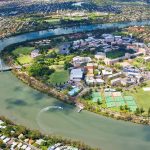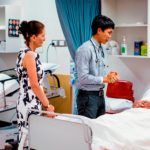Why study the Melbourne Doctor of Veterinary Medicine?
The University of Melbourne’s Doctor of Veterinary Medicine (DVM) is based on the latest global thinking in veterinary science practice, teaching, and learning.
The Melbourne DVM degree gives you the experience and flexibility to succeed in your choice of veterinary career: as a small or large animal veterinarian, an animal welfare supervisor in the agricultural industries, an equine health professional, a government veterinarian monitoring wildlife health, or a zoo veterinarian.
After developing a strong core of veterinary science knowledge, you will be able to follow your own area of interest and gain a wealth of professional experience via the Melbourne Tracks program. You can take clinical or research placements anywhere in Australia or overseas, and even prepare yourself for leadership or industry roles with a concurrent diploma.
You will benefit from the experience and research expertise of world-class academics, and an innovative, evidence-based curriculum. Training throughout the degree will help you to develop strong communication and teamwork skills, and a final lecture-free year of clinical experience supports Melbourne students to become confident, professional, resilient and compassionate veterinarians.
Internationally recognized qualification
Work around the world with international recognition through accreditation by the Australasian Veterinary Boards Council, American Veterinary Medicine Association and Royal College of Veterinary Surgeons.
Be a part of a global community of veterinarians
At the University of Melbourne vet school, you’ll be part of a global community of students and alumni. The Melbourne DVM is known for the diversity of its students—you will study and graduate with classmates from not just Australia, but the United States, Canada, South and East Asia, Europe, and other regions.
Your lecturers will be leaders in their fields: pharmacologists and vaccine developers, surgical and medical specialists, public health experts. You’ll have the opportunity to gain professional experience on a wide variety of placements at veterinary clinics, other universities and organizations, from caring for pets in a city hospital in California, to monitoring farm animals and wildlife for disease in Vietnam or treating camels in Dubai.
Brand-new facilities
The recently redeveloped veterinary teaching hospital at Werribee is complemented by brand new teaching facilities, giving you access to the most modern veterinary facilities in Australasia, including specialist clinical skills laboratories, a new surgical teaching laboratory, extensive animal anatomy laboratories, and a veterinary student-specific lounge, library, and study areas.
Facilities at Parkville include a new dissection room for anatomy classes, student collaboration and socialization spaces, and an open aspect to the historic and tranquil Systems Garden.
DVM student experience FAQs
What type of animals will I get experience working on?
The major species are cattle, horses, small ruminants (e.g., sheep, goats), cats, dogs, and other miscellaneous animals. You will also gain experience working on birds and wildlife. As part of individual students’ extramural placements, working with other types of animals is also possible.
How much work experience or practical experience is undertaken within the course?
You will need to do work experience (extramural studies) during the course, both on farms and with veterinarians. This is a requirement of the course and it purpose is to enable you to understand how animals are managed on the farm and in society. Work with veterinarians reinforces other training provided in the course and exposes students to private practices and other veterinary professional activities. The pre-clinical extramural studies (“farm work”) is done in vacations between semesters or in the summer vacation of first and second years. Clinical extramural studies are rostered to begin after completion of examinations in third year.
Work experience prior to commencing the DVM is not a selection requirement but is highly recommended and may be used in decisions on admission through assessment of applicants’ personal statements.
Are there any exchange opportunities?
Not during the first three years; however, in the fourth year of the course you’re encouraged to undertake clinical or professional practice rotations (extramural placements) interstate or overseas.
Many veterinary science students have taken the opportunity to complete their extramural placements overseas. Due to the highly integrated curriculum of the course (and the formal accreditation requirements of the highly structured course) it is generally not possible to undertake coursework at other veterinary science colleges/institutions for course credit toward the DVM.
Melbourne DVM Fast Facts
Program: Doctor of Veterinary Medicine (DVM)
Location: Melbourne, Victoria
Semester intake: February
Duration: 4 years
Application deadline: Varying rounds; you are strongly encouraged to apply as early as possible.
Start your application to Melbourne Veterinary School!
*




































Ask A Question
Ask us about your program of interest, or if you have a question about our services.
CONTACT US TODAY